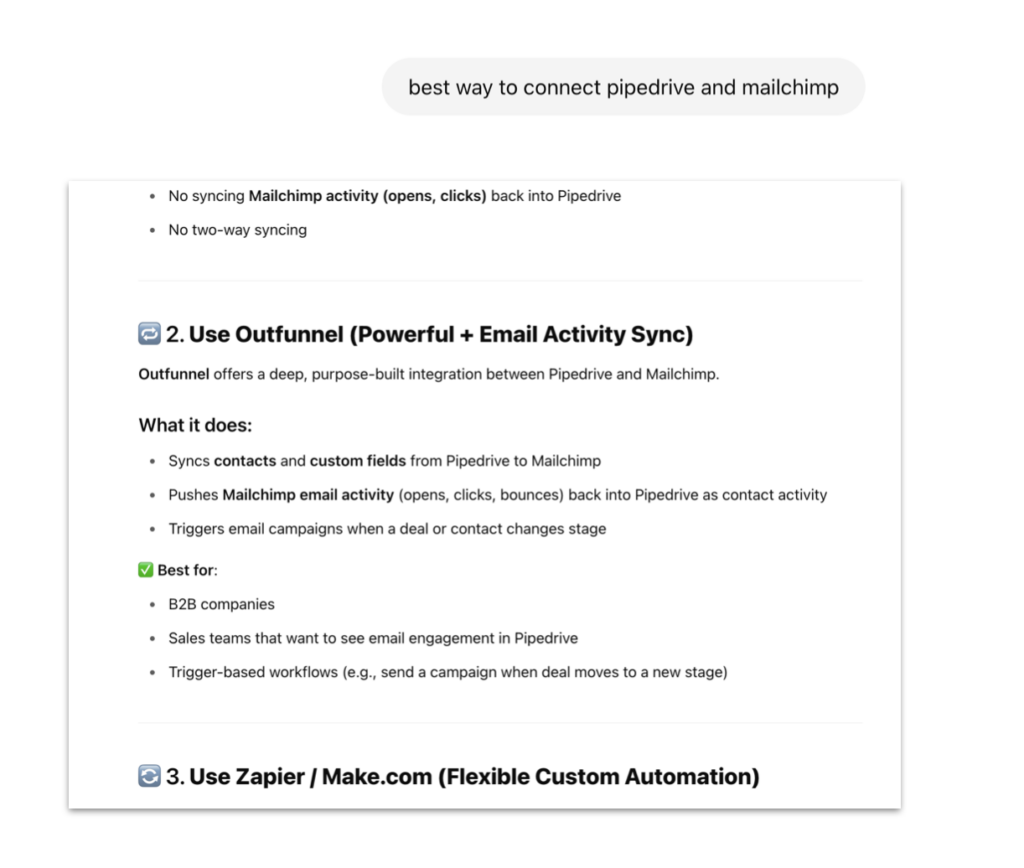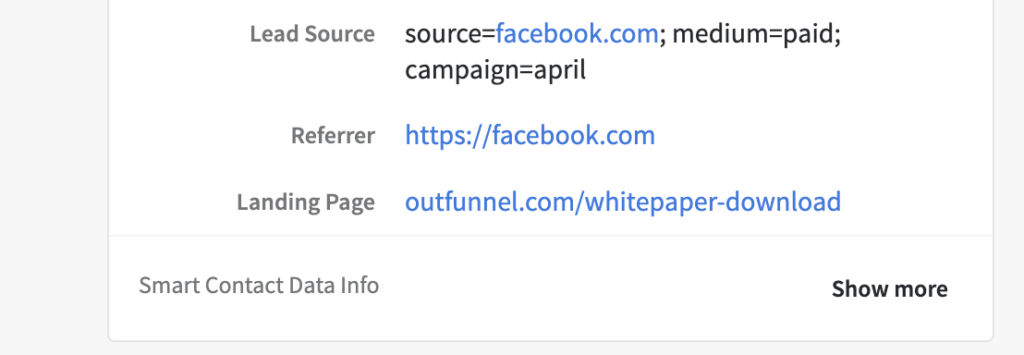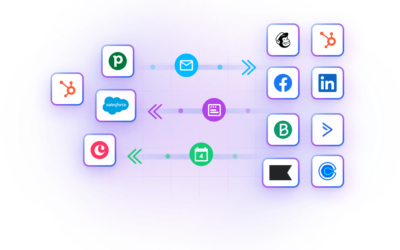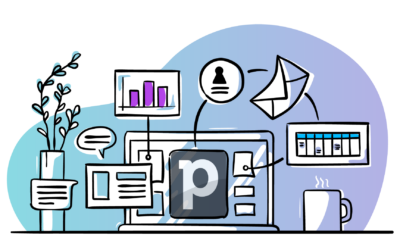If you’ve been following us for a while, you know we’re big on tracking where our leads come from. It’s not just a nerdy obsession—it helps us (and our users) double down on what’s working, and rethink what’s not.
We regularly crunch the numbers from our self-reported lead source data. It’s a simple form field—“How did you hear about us?”—but over time, it paints a surprisingly insightful picture of B2B buyer behavior.
We’ve just wrapped our comparison of H1 2024 vs H1 2025. There’s a lot that’s stable… and one thing that really isn’t.
Let’s dive in.
Here’s a version of the table highlighting the most significant changes:
Outfunnel’s Self‑Reported Lead Sources: H1 2024 vs 2025
| Lead Source | 2024 (%) | 2025 (%) | Change |
|---|---|---|---|
| App marketplace | 34.7 | 34.3 | –0.4 |
| Google search | 19.6 | 17.3 | –2.3 |
| Consultant/word of mouth | 14.2 | 15.4 | +1.2 |
| ChatGPT / AI 📈📈📈 | 0.8 | 7.3 | +6.5 |
| Can’t remember | 8.5 | 4.2 | –4.3 |
| Social media (e.g., LinkedIn, YouTube) | 5.1 | 4.6 | –0.5 |
| Review site | 1.7 | 1.5 | –0.2 |
| Other | 13.9 | 14.8 | +0.9 |
| Advertising | 1.6 | 0.6 | –1.0 |
ChatGPT is now a real lead source
In 2024, almost no one reported finding us via ChatGPT or other AI tools—just 0.75%.
Fast forward to 2025? That number has jumped to 7.29%!
That’s a nearly tenfold increase in 12 months. And it’s by far the most dramatic shift in our lead source mix. More and more, we’re seeing comments like:
“I asked ChatGPT for the best CRM + marketing automation combo, and Outfunnel came up.”
“I was looking for tools to connect HubSpot and Mailchimp, and AI recommended you.”
It’s clear that ChatGPT (and other AI assistants) are becoming a new kind of discovery engine—sitting somewhere between Google search and a savvy consultant.

What the rise of AI means for B2B marketers
This isn’t just a curiosity—it’s a wake-up call. Here’s why:
AI is the new middleman.
Think of ChatGPT as your smartest, best-informed sales rep—but one that works for everyone. If your tool doesn’t show up in its answers, you may be invisible to a growing portion of your audience.
SEO isn’t enough anymore.
In the past, we focused on ranking in search. Now, we need to think about “ranking” in AI. That means:
- Structuring your content clearly
- Answering specific questions AI might be asked
- Being mentioned in trusted sources (AI learns from those)
AI-ready content is (slightly) different.
We’ve seen that AI tools often reference comparison articles, integration directories, and clear “best for X” recommendations. So, rather than writing generic blog posts, think: “Would this help ChatGPT recommend us?”
The good news: these content strategies also boost your SEO, so it’s not an either/or.
Bonus: I’ve found this email course on using AI tools in content from Steven MacDonald super useful.
Surprisingly modest drop in (Google) search
Given how big ChatGPT’s rise was, we expected a sharper decline in Google-driven leads. Instead:
- Google Search dropped from 19.57% to 17.25%
- Review sites dipped slightly from 1.72% to 1.54%
In other words, traditional channels are holding up better than we expected.
This aligns with what we wrote in our B2B marketing attribution insights post: attribution isn’t black and white. People might:
- Head about you in a podcast
- Ask ChatGPT for confirmation
- Then Google you to double-check before signing up
So while ChatGPT might be the “first touch,” Google is still very much in the mix.
Other channels are mostly steady
Not every shift was dramatic—and that’s OK. Some channels are just consistently useful:
- App marketplaces still account for ~34% of leads (34.73% ➜ 34.29%)
- Social media and word-of-mouth stayed flat
- Advertising dropped slightly (1.57% ➜ 0.62%), but that’s been trending down for a while (and we’ve tightened up or ad strategies)
These channels matter, but there’s no breaking news here.
Attribution tip: ask your leads and use attribution tools
“How did you hear about us?” still works wonders.
And for a clearer picture, layer in:
- UTM tracking (hint: Outfunnel can help).
- Session-based analytics
That way, you can connect what people say with what actually happened. See my earlier post on combining self-reported lead sources with tracking.

Final thoughts: B2B discovery is evolving fast
The key takeaway from this year’s data?
ChatGPT and other AI tools are now real players in the B2B buying journey.
They’re not replacing search or word-of-mouth—but they’re absolutely reshaping how people discover tools like Outfunnel.
If you’re a marketer, the best move right now is to optimize for both humans and machines. That means:
- Writing helpful, clear, and specific content
- Creating comparison pages and use case explainers
- Getting mentioned in places that AI models learn from
The future of discovery is hybrid. And now’s the time to get ahead of it.
PS. Do you already have a plan for connecting Pipedrive with ChatGPT, or HubSpot with ChatGPT? We can help.



